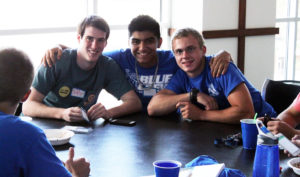At seven years old, Treven Treece of Morristown, Tennessee, decided he wanted to go to college. He would be the first in his family to do it. With no one to guide him, Treven had no idea how college worked. He applied to the University of Memphis and, as a first-generation college student, won a First Scholars® award that he says changed his life.
The Suder Foundation in Plano, Texas, created the First Scholars program in 2009 with a goal to dramatically increase the graduation rates of first-generation students like Treven—those who were the first in their family to go on to higher education. Entrepreneurs Deborah and Eric Suder had endowed scholarships prior to help mid-range academic, needs-based students get to school. “We naïvely thought that financial aid would assure their success. This was not the case,” says Eric. They learned that only 36% of first-generation students nationally were graduating.
First-gen students face distinct challenges that many legacy students do not: They are less academically prepared, often more financially strained, and have a harder time transitioning into college.
“When we started First Scholars, there were limited programs geared solely toward first-gen students, and those in existence focused on the freshman year only,” says Eric. “We reasoned that if we could address and mitigate, or even eliminate, the challenges common to many first-gen students, then we could bridge the gaps to help them stay in school and graduate.”
First Scholars awards incoming cohorts of 20 first-gen students $20,000 over four years at its six active university partners. Students engage in holistic programming that tends to their academic and financial needs as well as personal, professional, and social needs.
Scholars live in a shared campus dorm for the freshman year with their cohort of first-gen students. Together, they attend retreats, classes, and workshops and engage in campus and community service projects. They receive individualized faculty and peer mentoring, success planning, and guidance. With this high-touch holistic programming, The Suder Foundation has moved graduation rates among First Scholars students to 52% in four years, and 75% in six years.
 Yet First Scholars does more than get students to their cap and gown. It has catalyzed change across campuses in how they respond to and support first-gen students. At the Suders’ prompting, universities now track, measure, and support all first-gen students (not only First Scholars students)—something campuses weren’t doing in the past.
Yet First Scholars does more than get students to their cap and gown. It has catalyzed change across campuses in how they respond to and support first-gen students. At the Suders’ prompting, universities now track, measure, and support all first-gen students (not only First Scholars students)—something campuses weren’t doing in the past.
With their business mindset, the Suders originally started First Scholars as a data-driven “franchise” model that would be scalable across 100 major four-year public universities. Their hope was that the foundation would seed it, and universities would eventually take it on and sustain it. Over time and with learning, they have evolved their vision to meet university and funding realities. While maintaining partnerships with their core universities, the foundation is also now repackaging the best components of the First Scholars program as strategic initiatives to serve first-gen students at campuses countrywide.
First Scholars does more than get students to their cap and gown. It has catalyzed change across campuses in how they respond to and support first-gen students.
“We’ve joined the national conversation on first-gen success and are convening people to build awareness and move policy,” says Eric. “We hope to inspire more universities to see that focusing on first-gen students can meet their retention and graduation goals. First-gen success is a powerful return on investment.”
The highest ROI? Students like Treven Treece. “First Scholars gave me a shot,” says Treven. “It gave me the opportunity to go to college, and surpass everyone in my family who never was able to go. Now my children won’t be first-gen students. I can help them, and things will be different. First Scholars has changed the dynamic of my family for generations to come.”

